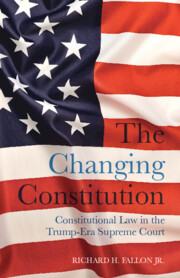Book contents
- The Changing Constitution
- The Changing Constitution
- Copyright page
- Dedication
- Contents
- Introduction
- 1 The Written Constitution and the Emergence of Judicial Supremacy
- 2 Historical Overview of Constitutional Adjudication by the Supreme Court
- 3 The Supreme Court Today
- 4 Freedom of Religion
- 5 The Freedom of Speech
- 6 The Expanding and Contested “Right to Keep and Bear Arms”
- 7 The Equal Protection of the Laws
- 8 Substantive Due Process and Unenumerated Fundamental Rights after the Overruling of Roe v. Wade
- 9 The Shrinking yet Still Formidable Powers of Congress
- 10 The Powers of the President and the Executive Branch in a Period of Ferment
- 11 Law and Change in the Supreme Court
- Index
5 - The Freedom of Speech
The Ascent of “The Persuasion Principle”
Published online by Cambridge University Press: 21 August 2025
- The Changing Constitution
- The Changing Constitution
- Copyright page
- Dedication
- Contents
- Introduction
- 1 The Written Constitution and the Emergence of Judicial Supremacy
- 2 Historical Overview of Constitutional Adjudication by the Supreme Court
- 3 The Supreme Court Today
- 4 Freedom of Religion
- 5 The Freedom of Speech
- 6 The Expanding and Contested “Right to Keep and Bear Arms”
- 7 The Equal Protection of the Laws
- 8 Substantive Due Process and Unenumerated Fundamental Rights after the Overruling of Roe v. Wade
- 9 The Shrinking yet Still Formidable Powers of Congress
- 10 The Powers of the President and the Executive Branch in a Period of Ferment
- 11 Law and Change in the Supreme Court
- Index
Summary
This chapter traces a series of stark, occasionally stunning historical reversals by the Supreme Court in interpreting the Free Speech Clause. It highlights doctrines under which the Court treats almost all content-based regulation of speech as constitutionally suspect. That position, which draws little support from research into original constitutional understandings, reflects a commitment – increasingly embraced by conservative justices of a libertarian stripe – to the principle that the Free Speech Clause bars the government from censoring speech based on fears that the speech might prove persuasive to its audience. The resulting doctrine, which makes the United States an outlier among liberal democracies, provides robust protection for a good deal of “hate speech,” some outright lies, commercial advertising, and corporate expenditures to promote political candidates. This chapter also discusses cases that have held that the Free Speech Clause protects a right to “freedom of association” that lacks any clear textual basis. It concludes by considering cases involving speech rights in “managerial domains” in which the government performs functions, such as providing public education, that it could not perform successfully without engaging in content-based regulation of speech.
Keywords
Information
- Type
- Chapter
- Information
- The Changing ConstitutionConstitutional Law in the Trump-Era Supreme Court, pp. 102 - 140Publisher: Cambridge University PressPrint publication year: 2025
Accessibility standard: WCAG 2.0 A
Why this information is here
This section outlines the accessibility features of this content - including support for screen readers, full keyboard navigation and high-contrast display options. This may not be relevant for you.Accessibility Information
Content Navigation
Allows you to navigate directly to chapters, sections, or non‐text items through a linked table of contents, reducing the need for extensive scrolling.
Provides an interactive index, letting you go straight to where a term or subject appears in the text without manual searching.
Reading Order & Textual Equivalents
You will encounter all content (including footnotes, captions, etc.) in a clear, sequential flow, making it easier to follow with assistive tools like screen readers.
Structural and Technical Features
You gain clarity from ARIA (Accessible Rich Internet Applications) roles and attributes, as they help assistive technologies interpret how each part of the content functions.
